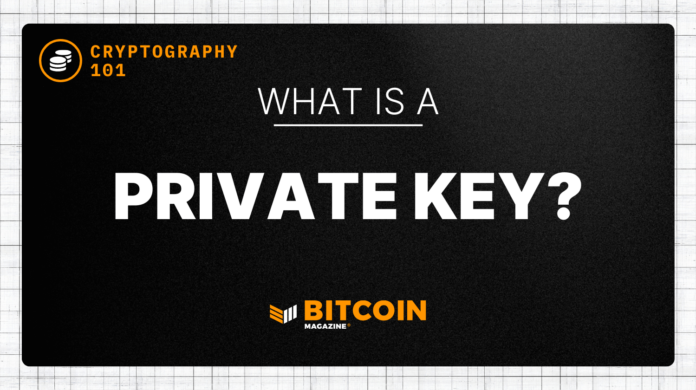A private key, also known as a secret key, is a cryptographic key that is used to decrypt or digitally sign data. It is a crucial component in asymmetric encryption algorithms like RSA and ECC (elliptic curve cryptography).
The term “private key” is often mentioned when discussing the security and functionality of Bitcoin. Understanding what a private key is and why it is crucial in securing your bitcoin is paramount for everyone. In this article, we delve deep into the concept of private keys, exploring their structure and functionality, and what role they play in cryptographic security measures.
Understanding the Basics of Cryptography
Before we dive into the intricacies of private keys, let’s first gain a clear understanding of the basics of cryptography. Cryptography, at its core, is the science of encrypting and decrypting information to ensure its confidentiality, integrity, and authenticity. It provides a secure way to transmit and store data securely in an insecure environment.
At the heart of cryptography lie keys — secret values utilized to transform plaintext data into jumbled ciphertext and vice versa. Cryptographic systems employ two key types: public keys and private keys.
The Role of Keys in Cryptography
Public and private keys are the gatekeepers of sensitive information. They serve as the foundation for encryption and decryption processes, safeguarding the security of digital assets. Public keys, as the name suggests, are shared with the public, while private keys remain confidential and accessible only to the owner.
Differentiating Between Public and Private Keys
To further distinguish between public and private keys, let’s shed more light on their respective roles and functionalities. Public keys are used to encrypt data, allowing for secure communication and verifying digital signatures. In contrast, private keys play a vital role in decrypting data and generating digital signatures.
Public keys, which can be thought of as locks, are freely distributed to anyone who wishes to send encrypted messages to the keys’ owner. These keys are used to scramble the data in a way that can only be deciphered by the corresponding private key — the key to unlock the encrypted information. Private keys, on the other hand, are the only key that unlocks the lock, and are kept secret and known only by the owner. They are used to decrypt the encrypted data received using the corresponding public key.

The Anatomy of a Private Key
Private keys are essentially passwords that grant access to your funds on the Bitcoin blockchain. Without a private key, you lose control over your bitcoin, thereby defeating the purpose of controlling your money in a self-sovereign way.
How Private Keys are Generated
Private keys are generated using an asymmetric algorithm that produces a random string of binary digits of a specific length, such as 256 bits for many modern encryption schemes. These algorithms utilize secure random number generators to ensure unpredictability. The resulting private key is a unique, secret value that is kept confidential by its owner. The random nature of private key generation ensures high entropy through security and uniqueness of each private key, making it virtually impossible to guess or discover through brute force.
When you create a new bitcoin wallet, the software generates a private key on your behalf. This key is typically hidden from view, known only to you and the wallet software (though not to the software creator or company that develops it). It’s essential to keep your private key secure and never share it with anyone to prevent unauthorized access to your funds.
The Structure and Components of a Private Key
A private key in Bitcoin is a 256-bit number, expressed as a long string of characters — a combination of letters and numbers. It is typically represented in a format known as wallet import format (WIF). The WIF format allows users to easily import their private keys into various Bitcoin wallets and applications.
Additionally, Bitcoin private keys are generated from a specific elliptic curve algorithm called secp256k1. The unique structure and components of a private key are the foundation of securing Bitcoin transactions and maintaining ownership of digital assets.
The Functionality of a Private Key
Having explored the generation and structure of private keys, let’s now shift our focus to their functionality. Private keys are at the heart of two essential operations in Bitcoin: encryption and decryption. They also create digital signatures for authentication purposes. Each private key is unique and should be kept confidential to prevent unauthorized access of one’s bitcoin.
Encryption and Decryption Process
When sending bitcoin from one address to another, private keys are utilized to decrypt the recipient’s public key, which allows the sender to access and transfer the desired amount. This process ensures the security and confidentiality of transaction data between parties involved.
It’s important to note that the encryption and decryption process is fundamental to the functioning of blockchain technology. By using private keys, users can securely send and receive bitcoin without the fear of interception or tampering.
Digital Signatures and Authentication
Another critical functionality of private keys lies in their ability to create digital signatures. Digital signatures provide a means to authenticate the origin and the integrity of Bitcoin transactions. By signing a transaction with their private key, users are sending a message that only they, as the key owner, could have been the source of the transaction.
Digital signatures are a key component in verifying the authenticity of blockchain transactions. They serve as a unique identifier for each transaction, ensuring that the sender is indeed the rightful owner of the funds being transferred.
Security Measures for Private Keys
Given the critical role of private keys in the Bitcoin ecosystem, adopting stringent security measures to protect them from unauthorized access, loss, or theft is essential.
Importance of Private Key Security
The security of private keys is paramount in safeguarding bitcoin holdings. Unauthorized access to a private key can result in the loss of bitcoin, making it vital for users to proactively secure their private keys and maintain control over their digital assets.
Best Practices for Protecting Private Keys
To mitigate potential threats, it is crucial to implement best practices for private key security. Modern bitcoin wallets facilitate enhanced security by auto-converting private keys into a 12- or 24-word mnemonic phrase, making them easier to manage, safeguard, and remember. These mnemonic phrases — essentially a human-readable form of the private keys — should be secured safely.
Securing Mnemonic Phrases
The best method to secure these mnemonic phrases is by stamping or engraving them onto metal seed plates. Metal seed plates offer durable and fire-resistant storage compared to paper or digital mediums, ensuring the long-term safety of these critical backup phrases. Users are also encouraged to store private keys or mnemonic phrases in a secure and hidden location.
By adhering to these enhanced security measures, users can significantly reduce the risk of unauthorized access to their bitcoin holdings, ensuring that they remain under their control.
Conclusion
In conclusion, private keys play a vital role in securing Bitcoin holdings and facilitating secure transactions. Understanding the basics of private keys, their role in cryptography, generation process, structure, functionality, and security measures is paramount for everyone who owns bitcoin.
With the knowledge gained from this article, readers can now appreciate the significance of private keys and adopt robust security practices to protect their assets. Remember, your private key is the key to your bitcoin, and it is crucial to guard it with utmost care and diligence to ensure the safety of your investments.






